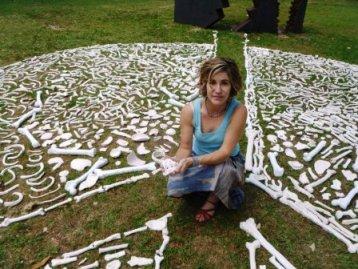Laying out the bones: People come to grips with genocide

For the last several months, at local schools, social service agencies, senior citizen centers, art galleries and even ice cream shops, Tallahassee residents have made human-figure bones out of clay: fingers, legs, skulls, arms, spines, feet, etc. On Saturday, they will display their handiwork to the community — which they hope will join them in protesting international genocide.
The event is part of the Million Bones Project, a national effort to place 1 million handmade clay bones on the National Mall in Washington D.C. in May 2013. The project, conceived by New Mexico artist Naomi Natale two years ago, is intended to raise awareness of the millions of victims of political and tribal killings in Africa, Asia and the Mideast.
Students Rebuild and the Bezos Family Foundation have pledged $1 for every bone made up to $500,000. The money will go to victims of violence in the Republic of Congo and Somalia.
Beginning at noon Saturday, participants will lay out bones along the center walkway of Bloxham Park, one of the chain of parks between Monroe and Calhoun streets. Participants are encouraged, but not required, to wear white in solidarity with the white clay bones.

College of Social Work.
“These bones symbolize the bones of the victims of violence,” said Jane McPherson, organizer of the event. “(Those victims) never experienced any kind of respectful burial. This is their first opportunity to experience that respect.”
Tallahassee is one of 34 state capitals participating in Saturday’s “Day of Action” ceremonies, as organizers try to bring the issue before political leaders. And it’s been one of the most successful. About 200,000 bones have been made around the nation, with Tallahassee having already produced the 6,500 bones that will be placed in Bloxham Park.
“Tallahassee has really embraced this project; 6,500 will be one of the biggest installations (in the 34 capitals),” said Kathleen McEuen, national liaison for the Albuquerque-based Million Bones Project. “It’s incredibly inspiring to see.”
Tallahassee’s success is largely a tribute to McPherson, who teaches in the Florida State University College of Social Work as she pursues her Ph.D. in social work. A year ago, a friend introduced her to the Million Bones Project — and McPherson was galvanized. She began having her students make bones and brought in speakers from countries torn by genocide. She recruited local artists and schools to hold bone-making sessions and has organized 25 bone-making events since January.
McPherson spent 20 years as a licensed clinical social worker and therapist, often working with low-income residents, before returning to FSU in 2009. She became convinced many of her clients suffered a basic lack of human rights (“a decent job, a decent place to live, a standard of living above the poverty level”) and returned to education hoping to improve the help they received from people like her.
“My goal is to teach social work from a human rights perspective and this project is exactly the kind of thing I want to do,” said McPherson, 48, a married mother of two teenagers. “I saw this as a way to engage my students in community practice and get them involved in the tradition of social work, based around human rights.”
McPherson’s energy inspired students such as Melise Brown and Caroline Labarga, who have participated in many bone-making events and are organizing students to continue making bones through next year.
Brown is the daughter of a Jacksonville federal prosecutor, Rodney Brown, who was sent to Iraq to prosecute Saddam Hussein for human rights violations in that country.
She said she knew little about genocide until her father’s experience and McPherson’s class.
“This project really set me on fire; I don’t know how anyone cannot have a heart about genocide and I wanted to bring it to FSU,” said Brown, who graduates in December and wants to work for a human rights organization. “I think this project is really raising awareness because I know I was not the only one not educated on the subject.”
Mukweso Mwenene said such awareness is critical. Mwenene is a native of the Democratic Republic of the Congo, whose country has been a victim of warfare in neighboring Rwanda and the exploitation of the Congo’s natural resources.
Members of Rwanda’s warring tribes have continued their fight in the Congo – “(Rwanda) instituted a policy of hot pursuit, which is the international equivalent of (Florida’s controversial gun law) ‘Stand your ground,’ ” Mwenene said – while other armed groups try to dominate the market in Congolese gold, timber and coltan, a valuable mineral used in cell phones.
Those forces have conscripted young Congolese boys into their armies and made a practice of raping women in every village they invade – in front of their husbands and families.
Yet the world is little aware of the atrocities in his home country, Mwenene said, a situation the Million Bones Project is helping to change.
“This project is critical to exposing this violence,” said Mwenene, an administrator with the Florida Department of Children and Families, who has lived in Tallahassee since the 1980s, when he came to get a graduate degree at FSU. “All this will bring it to people’s attention. People in Tallahassee are going to come out and see these bones and that will trigger some thought.”
Hopefully, the thoughts continue past Saturday. McPherson said local participants will keep making bones, and keep enlisting new participants, through the 2013 event in Washington D.C.
“This is just the beginning,” McPherson said. “We want to keep these bones in public view and keep this issue in public discussion.”
For more information, visit One Million Bones Tallahassee on Facebook or send questions to millionbonestallahassee@yahoo.com
